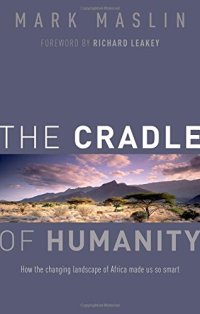
Ebook: The Cradle of Humanity: How the Changing Landscape of Africa Made Us So Smart
Author: Mark Maslin
- Tags: Evolution, Fossils, Game Theory, Genetics, Molecular Biology, Organic, Paleontology, Science & Math, Biology & Life Sciences, Anatomy & Physiology, Biology, Botany, Ecology, Zoology, Science & Mathematics, New Used & Rental Textbooks, Specialty Boutique
- Year: 2017
- Publisher: Oxford University Press
- Edition: 1
- Language: English
- pdf
One of the fundamental questions of our existence is why we are so smart. There are lots of drawbacks to having a large brain, including the huge food intake needed to keep the organ running, the frequency with which it goes wrong, and our very high infant and mother mortality rates compared with other mammals, due to the difficulty of giving birth to offspring with very large heads. So why did evolution favour the brainy ape? This question has been widely debated among biological anthropologists, and in recent years, Maslin and his colleagues have pioneered a new theory that might just be the answer.
Looking back to a crucial period some 1.9 million years ago, when brain capacity increased by as much as 80%, The Cradle of Humanity explores the implications of two adaptive responses by our hominin ancestors to rapid climatic changes - big jaws, and big brains. Maslin argues that the impact of changing landscapes and fluctuating climates that led to the appearance of intermittent freshwater lakes in East Africa may have played a key role in human evolution. Alongside the physical evidence of fossils and tools, he considers social theories of why a large, complex brain would have provided a major advantage when trying to survive in the constantly changing East African landscape.
Looking back to a crucial period some 1.9 million years ago, when brain capacity increased by as much as 80%, The Cradle of Humanity explores the implications of two adaptive responses by our hominin ancestors to rapid climatic changes - big jaws, and big brains. Maslin argues that the impact of changing landscapes and fluctuating climates that led to the appearance of intermittent freshwater lakes in East Africa may have played a key role in human evolution. Alongside the physical evidence of fossils and tools, he considers social theories of why a large, complex brain would have provided a major advantage when trying to survive in the constantly changing East African landscape.
Download the book The Cradle of Humanity: How the Changing Landscape of Africa Made Us So Smart for free or read online
Continue reading on any device:

Last viewed books
Related books
{related-news}
Comments (0)